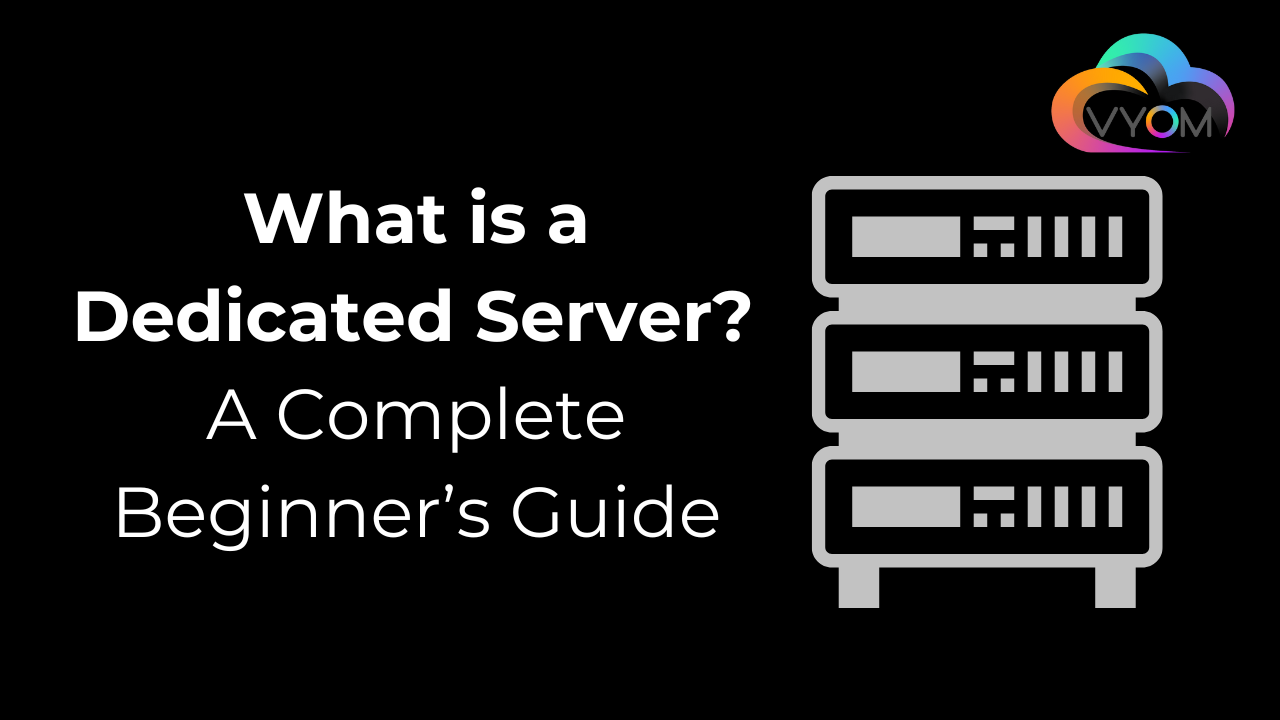- What is a Dedicated Server? A Complete Beginner’s Guide
- Understanding the Basics: What is a Dedicated Server?
- How Does a Dedicated Server Work?
- Types of Dedicated Servers
- Benefits of a Dedicated Server
- When Should You Choose a Dedicated Server?
- Dedicated Server vs VPS vs Shared Hosting
- How Much Does a Dedicated Server Cost?
- How to Choose the Right Dedicated Server Provider
- FAQs
- Related Reading
What is a Dedicated Server? A Complete Beginner’s Guide
In the digital age, websites, apps, and online services have become more demanding than ever. Businesses need fast, secure, and reliable hosting solutions to keep up. This is where dedicated servers come in.
If you’ve ever wondered what a dedicated server is, how it works, and why companies pay for it, this guide will walk you through everything in simple terms — without the tech jargon overload.
Understanding the Basics: What is a Dedicated Server?
A dedicated server is a physical computer that’s rented or purchased exclusively for your use. Unlike shared hosting, where multiple websites share resources, a dedicated server gives you full control over the hardware, software, and configurations.
Think of it like living in your own house instead of an apartment building. You don’t share the kitchen, the parking space, or the water supply with anyone. The entire property is yours, and you can customize it as you wish.
How Does a Dedicated Server Work?
A dedicated server is made up of:
-
Powerful Hardware: High-speed processors (often multiple CPUs), large amounts of RAM, and enterprise-grade SSD or HDD storage.
-
Operating System: Windows Server, Linux distributions like Ubuntu, CentOS, or Debian.
-
Network Connection: High bandwidth to ensure fast data transfer and uptime.
-
Dedicated IP Addresses: Unique IPs for your server, which help in branding and security.
When you rent or buy a dedicated server from a hosting provider, they install the OS, set up the network, and may even handle security updates and monitoring (if you choose managed hosting). You then use Remote Desktop Protocol (RDP) or SSH to access and control it.
Types of Dedicated Servers
Not all dedicated servers are the same. Depending on your needs, you can choose:
-
Managed Dedicated Server – The hosting company takes care of updates, monitoring, backups, and security.
-
Unmanaged Dedicated Server – You’re responsible for everything from installation to maintenance. Best for experienced IT teams.
-
Bare Metal Server – A physical server with no virtualization. Offers maximum performance and customization.
-
GPU Dedicated Server – Equipped with powerful graphics cards for AI, machine learning, and video rendering tasks.
Benefits of a Dedicated Server
A dedicated server offers multiple advantages over shared or VPS hosting:
-
Full Control – Install any software, configure any settings, and optimize performance your way.
-
Better Performance – All resources are yours, so your website or app runs faster and handles more traffic.
-
Higher Security – No risk of other users’ vulnerabilities affecting your site. You can implement your own firewalls, encryption, and monitoring.
-
Scalability – Easily upgrade hardware when your business grows.
-
Dedicated IP – Helpful for branding, SEO, and running email campaigns without blacklisting issues.

When Should You Choose a Dedicated Server?
Dedicated servers aren’t for everyone. They make sense if:
-
Your website gets high traffic every day.
-
You run resource-heavy applications like databases, ERP systems, or streaming platforms.
-
You handle sensitive customer data that requires top security.
-
You want custom software setups that shared or VPS hosting can’t handle.
-
You’re running game servers, AI workloads, or video editing pipelines.
Dedicated Server vs VPS vs Shared Hosting
| Feature | Shared Hosting | VPS Hosting | Dedicated Server |
|---|---|---|---|
| Resource Allocation | Shared with others | Divided virtually | 100% yours |
| Performance | Low to Medium | Medium to High | Very High |
| Security | Lowest | Moderate | Highest |
| Cost | Low | Medium | High |
| Best For | Small websites | Growing businesses | Large enterprises & high-traffic apps |
How Much Does a Dedicated Server Cost?
The cost varies based on:
-
Processor type (Intel Xeon, AMD EPYC, etc.)
-
RAM size (8GB to 1TB+)
-
Storage type (HDD vs NVMe SSD)
-
Bandwidth
-
Managed vs Unmanaged service
In India, prices can range from ₹5,000/month for basic unmanaged servers to ₹40,000+/month for high-performance enterprise setups.
How to Choose the Right Dedicated Server Provider
When selecting a provider, consider:
-
Uptime Guarantee (Aim for 99.9% or above)
-
Data Center Location (Closer to your audience = faster speeds)
-
Support Availability (24/7 customer support is a must)
-
Security Features (DDoS protection, firewalls, backups)
-
Customization Options (Ability to upgrade CPU, RAM, and storage)
FAQs
Q1. Is a dedicated server faster than VPS?
Yes. A dedicated server offers exclusive access to hardware resources, which means faster speeds and better performance compared to VPS.
Q2. Do I need technical skills to run a dedicated server?
If you choose an unmanaged plan, yes. For managed plans, the hosting provider handles most tasks.
Q3. Can I host multiple websites on a dedicated server?
Absolutely. You can host multiple websites and applications without performance drops.
Q4. Are dedicated servers secure?
Yes, especially if you configure them correctly and keep them updated. They’re more secure than shared hosting.
Q5. How long does it take to set up a dedicated server?
Usually within a few hours, depending on the provider and setup complexity.
Related Reading
Read More : How to Build Your First N8N Automation Step by Step
Let’s Get Social:
Facebook: https://www.facebook.com/vyomcloudnetwork/
LinkedIn: https://www.linkedin.com/company/vyomcloud/
Instagram: https://www.instagram.com/vyomcloud/

